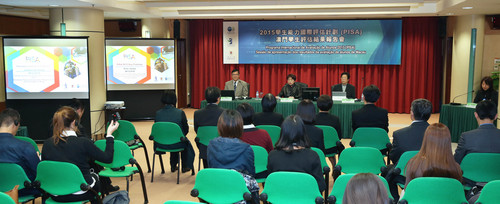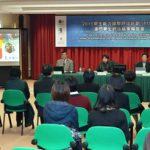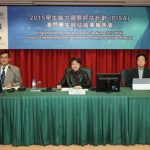 Press conference
Press conference
Macao, special administrative region of People’s Republic of China participated in Organisation for Economic Co-operation and Development’s (OECD) Programme for International Student Assessment (PISA) for the first time in 2003. Since then, Macao participated in this three-yearly programme in 2006, 2009, 2012 and 2015. In 2018, Macao will participate for the sixth time. PISA2015 examined the effectiveness of the basic education of all the 15-year-old secondary students born in 1999. The majority of these students were studying in Form 3 and 4 (Grade 9 and 10). For the first time, Grade 10 was the modal grade of the 15-year-old students, and the percentage of students studying in Grade 10 exceeded half of the total sample of Macao’s 15-year-old school population. This finding suggests that Macao is successful in reducing the rate of the grade repetition in its basic education system. In each PISA cycle, three core literacies are assessed, namely, reading, mathematical and scientific literacy. The main focus of PISA2015 was on the assessment of scientific literacy. Amongst the 72 countries/economies participated, Macao is high up in the PISA2015 league table of literacy performance: ranked sixth in scientific literacy (score= 529), twelfth in reading literacy (509), and third in mathematical literacy (544). See Table 1 for details. Scientific literacy consists of three subscales, i.e. Explaining phenomena scientifically, Evaluating and designing scientific enquiries, Interpreting data and evidences scientifically. Macao is high up in the league table of performance of the three scientific literacy subscales: ranked seventh in Explaining phenomena scientifically (score= 528), sixth in Evaluating and designing scientific enquiries (525), and fifth in (532). Amongst the three reported subscales of scientific literacy, Macao students’ performance is best in Interpreting data and evidences scientifically. Students generally are quite good at analyzing data and evaluating evidences presented in various formats, and proposing appropriate scientific conclusions. Comparing the findings of PISA2015 with PISA2006, PISA2015 reveals that Macao students’ scientific literacy performance has been increasing steadily. More than 90% of Macao students reach the baseline level of the overall scientific literacy performance scale. At the same time, the proportion of students who are able to reach the medium or high level of performance has also increased. Admittedly, there is gender difference in scientific literacy performance. In PISA2015, females outperformed males to a significant extent. One minor focus of PISA2015 is on the assessment of mathematical literacy. In PISA2015, Macao students’ performance is the best amongst all previous cycles of PISA. Not only percentage of students attaining medium level or above has increased considerably, but also those attaining below baseline level has decreased appreciably. However, comparing with previous cycles of PISA assessment, females’ progress in mathematical literacy performance is greater than that of the males. In each of the previous cycles of PISA assessment (i.e. from PISA 2003 to PISA2012), there are considerable improvement in mathematical literacy performance for the females than the males. In PISA2015, females start to outperform males in mathematical literacy. Another minor focus of PISA2015 assessment is on the assessment of reading literacy. In PISA2015, Macao students’ reading literacy performance was found to have improved considerably. Percentage of students reaching medium or high levels of reading performance has increased, whereas those not attaining the baseline level has decreased. Macao males come closer to the average of the OECD countries. However, there is still great room for the improvement of gender difference in reading literacy favoring the females, which for the first time is greater than the average of the OECD countries. Same as previous cycles of PISA assessment, the impact of economic, social and cultural status (ESCS) on literacy performance is also one of the weakest amongst the 72 participating countries/economies. The slopes of the ESCS gradient lines are all also very gentle. Not only the share of low-performing students in the student population is one of the lowest, but also the share of academic resilient students in the student population is one of the highest amongst all participating economies in PISA 2015. Range of student performance at both high and low ends of the literacy continuum, as well as both the magnitude of between- and within-school variances are small enough that are indicative of a homogeneous school population. In a nutshell, Macao’s education system is not only of very good quality, but also of very high equity. High level of science and technology is of paramount importance raising the economic development of countries/economies in the 21st century. Cultivation of talents who are able to take the initiative to innovate and explore in scientific and technological arenas will bring a nation or an economy to new heights. In OECD countries, on average 1/4 of its 15-year-olds anticipate to embark on a career related to science and technology. For Macao, it is 1/5. Also, Macao males are aspiring more than the females to embark on a career related to science and technology. Educational practitioners should reflect on how to assist students to further their study and enter the workplace smoothly. There are fervent needs to foster 21st century skills in students so as to meet the challenges of contemporary societies. Based on the plans of students’ career and Macao’s societal development, schools should put forward proposals to cultivate talents who are able to play prominent roles in the society. Education policies should pay due attention to individual differences manifested in the school population. There are needs to initiate plans to help males to study effectively. Pastoral care needs to be strengthened, and academic support rendered to students at the full range of the ability continuum should be increased. Regarding this, plans with a focus on individually configured education should be furnished, so that students’ inner potentials can be maximized. There are needs to pay due attention to the education of the males, so that alongside with the females they collaborate to raise the overall quality of Macao’s basic education system. Macao ranks amongst the leading positions amongst 72 countries/economies in the various league tables of literacy performance in PISA2015. The results showed that Macao’s basic education system has made considerable progress since Macao’s return to its motherland in 1999. The success of Macao in PISA2015 is mainly due to that its basic education system is able to increase the proportion of students with middle/high proficiency levels in the three literacy domains, as well as to reduce the share of low-achievers who are below the baseline level of literacy performance. See Figure 1 for details.
View gallery


